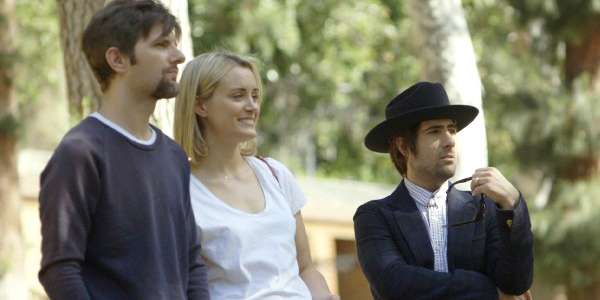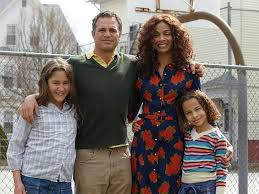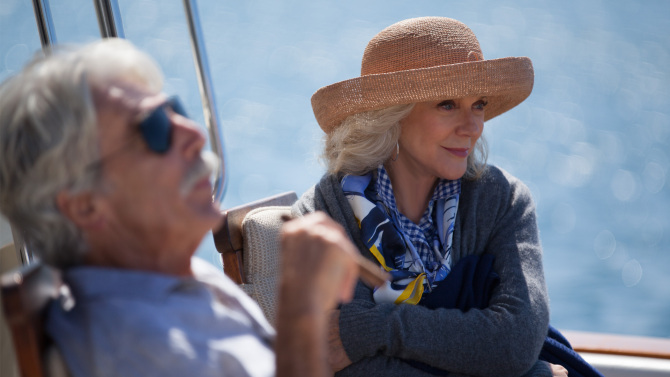Interview: Patrick Brice on the Very R-Rated Comedy “The Overnight”
Posted on June 25, 2015 at 3:01 pm
Writer/director Patrick Brice talked to me about his funny and provocative new film, “The Overnight,” about a couple new to Los Angeles (Adam Scott and Taylor Schilling) who are invited to dinner at the lavish home of an impossibly hip and creative couple (Jason Schwartzman and Judith Godrèche). Once the children go to sleep, the evening gets pretty wild.
I like the way this movie takes on the difficulty and complications and challenge of forming friendships when you have to factor in the interests and chemistry of four different people.
I think it takes twice as much effort and that’s kind of what the film hopes to explore. That difficulty is one of the driving factors that keeps the couple from leaving from leaving the house no matter how weird things are getting. You know, there is still this idea that “Well, maybe things will be okay,” and “Well maybe this is our chance to make friends and we need to make this work for us.” A lot of the film came out of me observing and understanding what a lot of young friends of mine are going through right now, having to reconcile a social life with being a parent at the same time.
Where did you find that amazing house?
That house came after a long long search. We had looked at probably 15 houses before that. And finally we ended on that one. It is a Spanish styled house up in the Hollywood Hills. It’s actually right above Lake Hollywood. Originally, the film was going to be kind of more pointed satire of my neighborhood, Silver Lake. But it’s not a real Silver Lake type house. It is much more of a traditional Los Angeles house. And so I’m happy with where it ended up because it feels kind of surreal. It feels a little more gaudy and not really of any particular time. It feels like they kind of go to Mars.
When the gate opened up, it was like going into the Emerald City.
I definitely wanted things to feel more surreal as the night went on. Having a location like that gives you a lot to play with. And you know, keeping all the spaces within it dynamic was definitely a big goal for me and for Theresa Guleserian, the production designer.
You’ve worked with the Duplass brothers, who were producers on this film. What did you learn from them?
One of their biggest considerations is trying to make the most out of a smaller budget. And that can be something you think of during production, but one thing I learnt right on this movie was that it is okay if this is something you can think of during the writing process. And it doesn’t have to be something that hinders your creativity, or keeps you from telling a story just as big as you want it to be. It can actually be kind of an interesting challenge and at the end of the day a refinement. So not being afraid of not having enough money to make the movie is a huge thing. There’s a trickledown effect with those guys in terms of their kindness and generosity and creativity and doing it for the love of movies. And I’m just so lucky to have been able to work with those guys. I think one of the biggest things we tracked on besides the strength to build this is, the sense of humor. We think the same stuff is funny and we like the same blend of sadness and pathos and humor. We don’t think all those things are mutually exclusive from each other.
One of the stars, Adam Scott, and his wife were also producers. How did that happen?

Once Mark and I were happy with where I was with the script, we started taking it out to actors. Judith Godrèche was the first person we showed it to. She jumped on board and quite quickly and then the Scotts were the next folks that we took it to. I had met Naomi once she had come and helped us. She gave a critique on my previous film “Creep.” We had a talk back session on the screening and she was there. I knew she was wanting to produce a feature at some point. Most of her background has been in television production. And then Adam, I have just always been a big fan of stuff. Mark and I were having discussions and thinking about Adam as a possibility for the character of Alex and then, remembering that Naomi was interested in being a hands-on day to day producer, we thought, “Why not bring it to the two of them at the same time?” And I feel so lucky that they both said yes. They both read the script separately apparently and working with them was just a dream.
Adam is just someone who in the pocket and in the zone so often that you almost forget that he is acting. Or you forget that there is a chance that he could get a scene wrong emotionally, because he never does. He’s always been able to carry his own weight and he able really help out the other performers. I think he is a really good improviser, and I think a big part of that is knowing how to kind of save a scene emotionally or just keep things moving and he has a real knack for that.
Your style reminds me a bit of the very intimate, improvisational style pioneered by John Cassavetes. Are you a fan?
Thank you so much. Yes, I was thinking a lot about Cassavetes when I wrote it. I love the tension that can come from a kind of forced intimacy living with characters in real time. That was something that he was able to do so well. He was able to make a dance out of that with his actors. So I approached, with what as essentially on the page a broad comedy but I wanted to approach it with both the actors in terms of moment to moment, emotional growth in terms of how we shot it. Having something handheld and using only available lighting kept us nimble in terms of making it. I feel very validated by good response to this film so far and am excited to continue playing with this tone.





